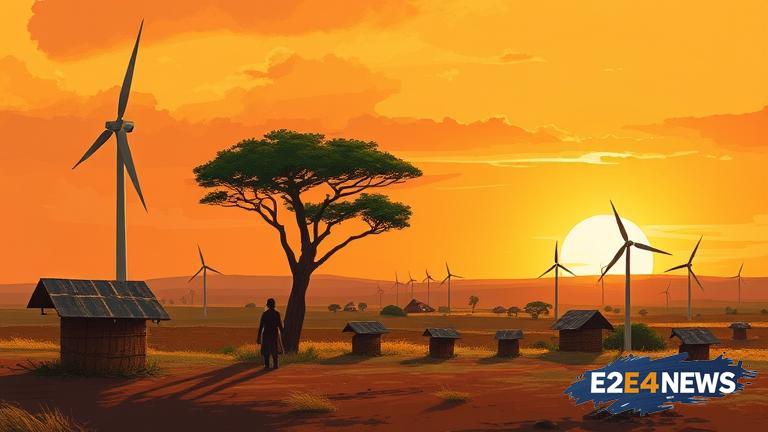The African continent is witnessing a significant shift towards renewable energy, driven by the need to address the pressing issues of energy access, energy security, and climate change. With a growing population and increasing economic activities, the demand for energy is on the rise. However, the traditional reliance on fossil fuels is no longer sustainable, and African countries are now exploring alternative energy sources. Renewable energy, particularly solar and wind power, has emerged as a viable option, offering a cleaner, more sustainable, and cost-effective alternative to fossil fuels. Several African countries, including South Africa, Morocco, and Egypt, have made significant strides in developing their renewable energy sectors. South Africa, for instance, has set ambitious targets to increase its renewable energy capacity, with a focus on solar and wind power. The country has already made notable progress, with several large-scale renewable energy projects coming online in recent years. Morocco, on the other hand, has invested heavily in solar power, with the launch of the Noor-Ouarzazate solar power plant, one of the largest in the world. Egypt has also made significant progress, with the inauguration of the Benban solar park, which is expected to generate over 1.8 gigawatts of electricity. Other African countries, such as Kenya, Tanzania, and Ghana, are also actively pursuing renewable energy development, driven by the need to address energy poverty and promote sustainable development. The growth of renewable energy in Africa is being driven by a combination of factors, including declining technology costs, improving energy efficiency, and increasing investment in the sector. International organizations, such as the African Development Bank and the International Renewable Energy Agency, are also playing a crucial role in supporting the development of renewable energy in Africa. The benefits of renewable energy are numerous, ranging from reduced greenhouse gas emissions to improved energy access and job creation. However, there are also challenges to be addressed, including the need for significant investment, infrastructure development, and policy frameworks that support the growth of the sector. Despite these challenges, the future of renewable energy in Africa looks promising, with the potential to transform the continent’s energy landscape and promote sustainable development. The African Union has set a target of achieving 100% access to electricity by 2030, and renewable energy is expected to play a critical role in achieving this goal. As the continent continues to grow and develop, the demand for energy will only increase, and renewable energy will be essential in meeting this demand. In conclusion, the renewable energy revolution in Africa is gaining momentum, driven by the need to address energy poverty, promote sustainable development, and mitigate climate change. With the right policies, investments, and technologies in place, Africa can unlock its vast renewable energy potential and achieve a sustainable energy future. The continent’s renewable energy sector is expected to continue growing, driven by the need for clean, reliable, and affordable energy. As the world transitions to a low-carbon economy, Africa is well-positioned to play a leading role in the global renewable energy market. The growth of renewable energy in Africa will have far-reaching benefits, ranging from improved energy access to job creation and economic growth. However, it will require sustained investment, policy support, and international cooperation to achieve the desired outcomes. The future of renewable energy in Africa is bright, and the continent is poised to become a global leader in the sector. With its vast natural resources, growing economies, and increasing demand for energy, Africa is an attractive destination for renewable energy investments. The continent’s renewable energy sector is expected to create new opportunities for economic growth, job creation, and sustainable development, and it is essential that African countries continue to prioritize the development of this sector.
